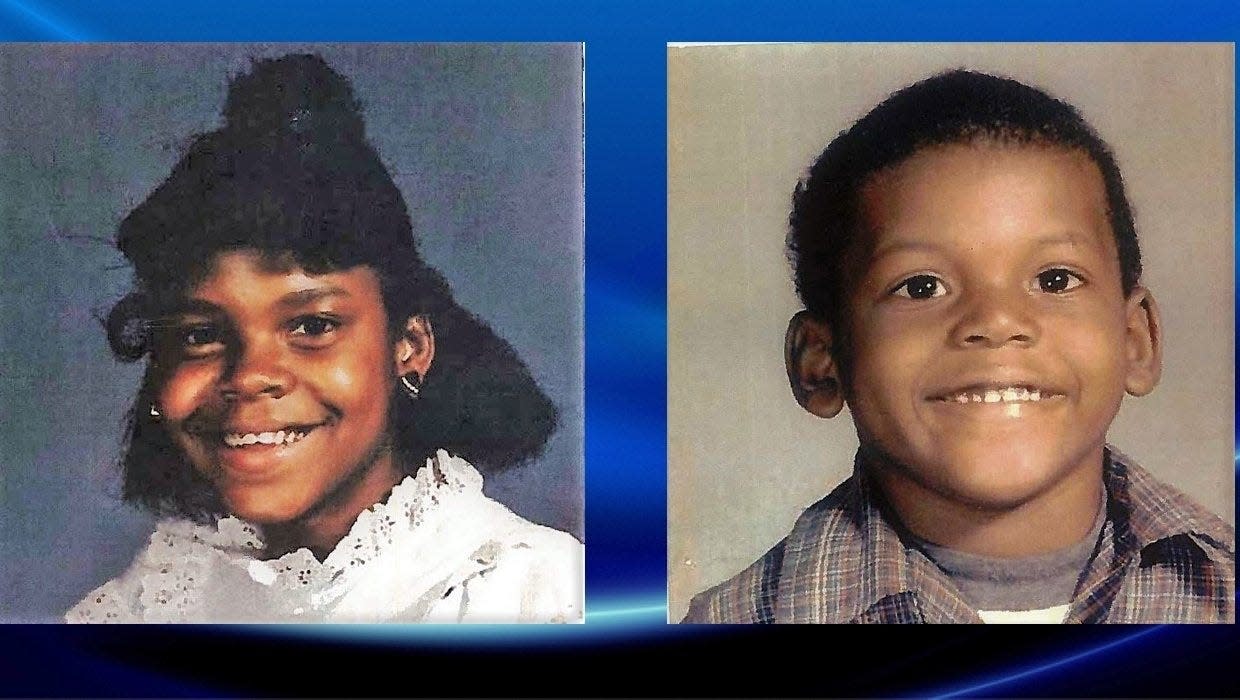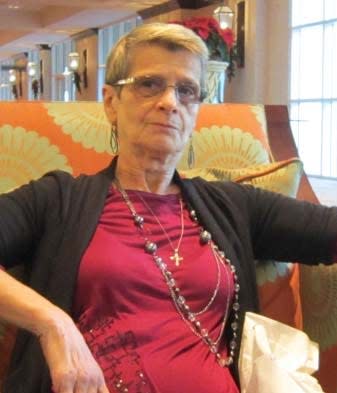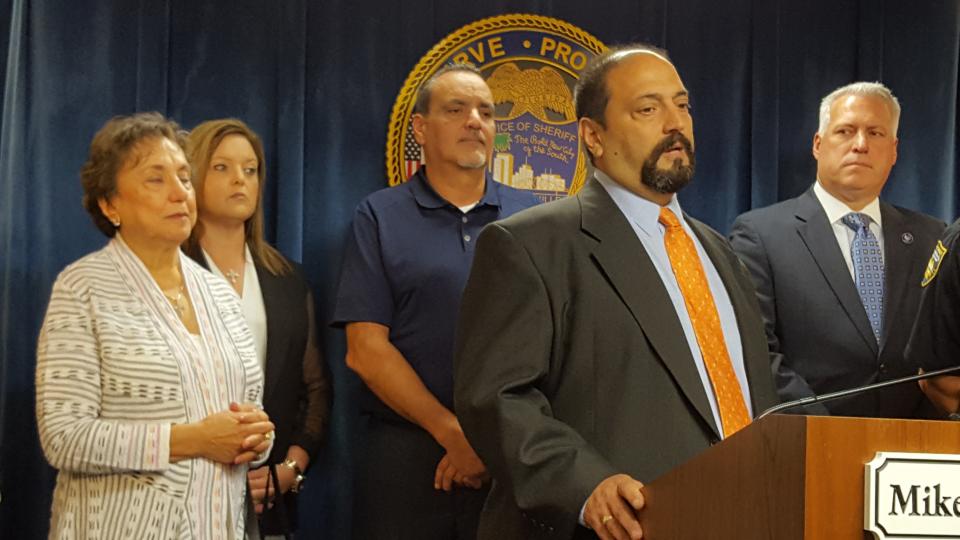Jacksonville-area cold cases: Sadness for families, frustration for those investigating unsolved deaths

- Oops!Something went wrong.Please try again later.
The victim has been mourned, his or her remains now buried or cremated to be visited by friends and family.
But the question remains, sometimes for years or even decades — who killed them, and why?
Northeast Florida has thousands of cold cases, defined as an unsolved criminal investigation of a homicide or abduction "that has stopped being actively pursued because of a lack of evidence," according to the Merriam-Webster dictionary.
But a clinical dictionary description can never reveal the depth of despair and emotion families and friends face from never knowing.
Cold case: Jacksonville police seek tips in 2013 cold-case homicide of Raines High senior
Unsolved: Hopes are high as Jacksonville detectives reopen 1991 cold-case homicide
Kara Trimmer remembers when Jacksonville police contacted her late Oct. 28, 2015, telling her they had found her 61-year-old mother dead in her home on Harlow Boulevard. The Florida Highway Patrol had discovered Bradla Sue Cook's burned car earlier near Hyde Park and Ellershaw roads on the Westside and traced it back to her home and remains.

The Sheriff's Office has revived its investigation into that cold case, six months after First Coast Crime Stopper increased the reward for tips that lead to an arrest. Detectives have again submitted DNA evidence to the Florida Department of Law Enforcement for updated testing, hoping that targets a suspect, and so does Trimmer.
"I am hopeful that detectives on the case can give us just that little sliver of hope that we all thought we had lost," she said, adding that maybe a new tip from someone who remembers something from six years ago can also help.
"It doesn't have to be much. It could just be that you drove down Harlow that night and saw a vehicle, or heard a sound on your walk," Trimmer said. "You don't have to have picture evidence, but a little is super important and would help."
Ryan Backmann still doesn't know who killed his father, Cliff Backmann, during an Oct. 10, 2009, robbery on Bonneval Road in Jacksonville.
That loss and the fact that so many other families never had closure, led to his 2015 founding of Project Cold Case after learning the Jacksonville Sheriff's Office had more than 1,200 unsolved homicides back then. Now his website database contains information on 1,500-plus unsolved Jacksonville homicides, plus others from 50 Florida counties, 46 U.S. states and three other countries
These days, Backmann said he now considers himself "a victim's advocate or a survivor."
"I can pinpoint the moment in my life where I felt like I was either going to be curled up in a corner feeling sorry for myself and pointing fingers at anybody I could to blame for how down and depressed I was, or I was going to have to make a conscious change and approach my situation differently," he said. "Once I did that, I never really felt like a victim again."
New technology, resubmitting evidence, offers new hope
The Jacksonville Sheriff's Office spotlights selected cold cases every few months in the hopes of gaining new leads, as it did in late September with 1987's double homicide of Bilalian and Yvonne Pinckney, a 10- and 14-year-old brother and sister.
Interviewed then, detective Glenn Warkentien said there are still no leads into whoever killed the siblings early that July 4 in their home on Brook Forest Drive. Cases like that frustrate him as well as encourage the Cold Case team to seek out new leads, no matter how long it's been,
"It's all of the above; obviously you don't want any case unsolved, but it does put a fire to you when you look at these and you find stuff there," Warkentien said. "What's helping us is the technology these days, not only with the latent prints, the DNA, the genetic genealogy which is solving a lot of cases now, and Ballistics Identification System, connecting all of these casings to other crimes."
The children's mother, mother Betty Pinckney McDuffey, also pleads for the public's help in finding their killer. The now-66-year-old woman said she still grieves.
"I never have given up hope and I still pray that someone comes back and helps me," McDuffey said. "I need closure, and it would make me and make my [other] son feel better. We need closure because still to this day, I can't sleep at night."
In the Cook homicide, detective Ray Reeves said evidence is being tested in the hopes that a hint of a suspect appears.
"We are hoping that some of the items we have been submitting for the first time, but also some of those we resubmitted, will give us a profile we can begin to run on," Reeves said. "We have re-interviewed people and had the opportunity to look back through this case, some information I gleaned from her daughter over the last couple of days."
Case solved: DNA leads to arrest in 1985 Christmas Eve kidnapping, rape and slaying of Jacksonville girl, 17
Raising awareness also means rekindling old memories that "could be helpful to us," he said. Cook's burned car was found 1.3 miles from her home and homicide site. And there was no sign of forced entry at the home.
"Whoever was there was either welcomed in or knew her," Reeves said. "There was some type of a relationship that was there. A few items were taken, but nothing significant. We do not believe this was a robbery gone wrong."
With so many cold cases that lack the tips or evidence to solve, Jacksonville Sheriff Mike Williams said his staff has to "maintain focus" on them and never stop looking. He said they have been very fortunate to solve some very old cases, and that speaks to the work his detectives are doing with new technology as well as their investigative experience.
"Remember, when a lot of these cases happened, not only did the technology not exist, but those investigative techniques to think about things like that did not," he said. "That's where the value comes in putting fresh investigative eyes on the cases that use technology every day."

Cases can become personal for investigators as well
In St. Johns County, criminal investigations division Lt. Jeremy Russell is still looking for leads on the April 2013 homicide of 67-year-old Village Inn waitress Barbara Parchem.
The Elkton woman was reported missing on April 6 of that year after not showing up for work at her North Ponce de Leon Boulevard restaurant. Authorities found her body on April 30 in a remote area of Flagler Estates in northern Flagler County. Final autopsy results concluded that she died from a gunshot wound.
Russell, who oversees St. Johns County's major crimes and special victims units, said they have processed evidence over the years and believe "we have a good direction to go in."
"But we are obviously still not quite there as far as bringing that person responsible to justice," Russell said. "I know we are going on eight years now and so if there are people out there who still have information, obviously we would like to talk to those folks."
So far none of the evidence gives them anything that could lead to a suspect, although they have developed a "narrow timeline" on what Parchem was doing and where on the day she died.

"We don't have a lot of trace evidence, DNA evidence that we are waiting on pending results in this case," Russell said. "We believe the person who has information related to what occurred that afternoon is a relative and they hold the key and the answers to resolving this case, whatever their involvement may or may not be."
Ultimately, the desire to solve a case can be "personal," Russell he said. Parchem's case was his first homicide as lead investigator .
"These are hard cases," Russell said. "... I have a binder that sits in my office next to me every day I come to work, and it is this case. I would like to see, before I retire, is to bring this case to a resolution. But we just haven't been able to get there yet."

Trying to keep cases alive, even if reality is cruel
Backmann said there are probably "very few things" that he wants more than answers in his father's death. His father's entry on the website shares the police report, saying a man robbed Cliff Backmann as he worked at a construction site, then shot him. "He was able to call 911 and give some details before he died, but not enough to catch his killer."
Backmann said he is realistic, knowing physical evidence gathered 13 years ago just might not be enough to help.
"That kind of stuff either doesn't exist in my dad's case," he said. "Or the amount of evidence is so small that the technology isn't there yet, and it never will be. So I have kind of come to terms with that to some degree. I am not happy about it."
Backmann said it "blew my mind" that the Sheriff's Office had not posted its unsolved homicides on its website when he began Project Cold Case. So now he hopes that someone reads one of the thousands of cases on Project Cold Case and a memory surfaces that can help investigators.
"If somebody has information, if a family feels that nobody cares anymore, they might see this and realize somebody does care," he said. "... We have had 33 cases that have been resolved and an arrest has been made or conviction obtained. We don't take credit for solving them. ... But we are certainly raising awareness on cases that have been out of the public eye, sometimes for decades."
When Jacksonville Mayor Lenny Curry thinks of homicide cases that have gone unsolved for years, even decades, he said he cannot imagine being a parent or sibling of someone killed with no suspect in sight.
Missing woman: Conviction upheld against husband in Jacksonville cold-case murder of Bonnie Haim
"Then the pain coupled with no resolution, not knowing and just no answers," Curry said. "In a perfect world, they would have all the answers, and that is where my prayers are. I know law enforcement, the leaders of the State Attorney's Office and the Sheriff's Office are caring people and want to see them solved as well."
Case closed: Arrests and resolutions can occur years and years later
As difficult as it is to resolve an old case, there have been some recent breakthroughs.
After no leads for years, new tests were done on DNA samples from the 1999 homicide of convenience store owner Saad Kawaf in an ambush at his Deerwood home. A 2003 lab test found profiles for a woman and two men, one apparently Kawaf. More evidence was tested in 2014, determining what had been found under Kawaf’s fingernails matched blood on his shirt.
Crime scene evidence submitted by the Florida Department of Law Enforcement in 2018 for new genetic analysis, plus other tests matched the DNA found under Kawaf’s left fingernail, the warrant said. The FDLE then confirmed who the DNA belonged to, leading to the arrest of retired Jacksonville sheriff's detective William Robert Baer Jr., 65, and his former wife, Melissa Jo Schafer on murder charges.
Baer was recently sentenced to life without parole for first-degree murder, kidnapping, armed robbery and aggravated battery, while Schafer accepted a plea deal on murder and armed-robbery charges in exchange for testifying and faces sentencing in December, the State Attorney's Office said.
Even smaller bits of evidence have led to arrests decades after a homicide.

Freddie Farah was killed May 22, 1974, in an attempted armed robbery at his Jacksonville grocery store. Fingerprints found on a box of cake mix and a can of frosting were tested then and in 1998, but no match emerged, police said. Then in December of 2017, the Sheriff’s Office used new fingerprint identification systems and found a match, leading to the arrest of New Orleans street performer Johnie Lewis Miller.
The 4th Judicial Circuit State Attorney’s Office also received a $470,000 U.S. Department of Justice grant earlier this year to support investigative activities and prosecution of violent cold cases after DNA from a suspect has been re-examined and identified. This helps its Cold Case Initiative review, investigate and prosecute the hundreds of violent crimes that had so far eluded resolution for years.
And as always, fresh tips on a cold case can still be sent anonymously to First Coast Crime Stoppers, which are passed on to police. So make the call and pass on a tip, Crimes Stoppers Executive Director Wyllie Hodges said.
"Try not to let cases get cold because they get harder and harder to solve, and people who have information die or move," Hodges said. "... We have solved a few in the past year that are 10 or 15 years old from Crime Stoppers tips. The tips work, we guarantee the anonymity and we pay rewards."
Anyone with information about any homicide can contact the Jacksonville Sheriff’s Office at (904) 630-0500 or e-mail police at JSOCrimeTips @jaxsheriff.org. Witnesses can also anonymously contact First Coast Crime Stoppers at (866) 845-8477 (TIPS), rewards@fccrimestoppers.com or via the P3 Tips mobile app at bit.ly/3pYupP3.
dscanlan@jacksonville.com: (904) 359-4549
Here are 15 Northeast Florida unsolved deaths
• Nov. 18, 2020: Shooting at 6400 Macy Ave. at an Arlington Football Association game. A 27-year-old father was killed, while his 7-year-old son was injured when someone in a gray hoodie and mask exited a gray or silver SUV and sprayed the crowded field with bullets.
• Aug. 29, 2020: Shooting at 7600 Kona Ave. A pregnant woman in her late 20s was shot inside an apartment, and her unborn child died.
• Jan. 31, 2019: A suspicious death at the Laterra Condominium at 945 Registry Blvd. in St. Johns County of Ellie Marie Washtock, 38, who was independently investigating the controversial death of Michelle O’Connell. The 24-year-old O’Connell was the girlfriend of a St. Johns deputy. Investigation ruled that she shot herself with his gun in 2010, but the family and other evidence point to the boyfriend, Deputy Jeremy Banks. Active investigation.
• Aug. 22, 2018: Undetermined death at 2126 Placeda St. as Annie Ruth Miller, 35, was found dead in the roadway, with Deborah Sharon Ziegler, 58, dead in a nearby vehicle.
• June 11, 2018: Aggravated battery at 7219 Rutledge Pearson Drive. Officers found 14-year-old Darryl Lamar Johnson lying in nearby woods. A neighbor said she thinks it involved a purse snatching by some boys and that Johnson was shot because he didn’t want to be a part of it.
• June 5, 2018: Shooting deaths at 4085 Town Center Parkway and Interstate 295. Officers found four victims shot inside a car. Trevon Bullard, 18, Royale D’Von Smith Jr., 18, and Jercoby Da’Shad Groover, 19, were dead. The fourth, rapper Yungeen Ace (Kenyata Bullard), was in critical condition. An unknown vehicle pulled up next to theirs and the shooting began. Detectives said the victims were targeted based on an ongoing dispute between two groups.
• June 1, 2018: A shooting at 1568 Ella St. left Antonia Antwon English, 38, dead between two abandoned homes. A transgender woman, she was able to tell police that an unknown man in a gray hoodie shot her from the road as she was urinating.
• Dec. 2, 2017: Quasean Latrelle Trotter, 20, Ariyan Larondak Johnson, 19, and Arielle Trotter, not yet 1, were found dead in a fire-damaged home at 8916 India Ave. News reports indicated the couple was shot, and the child died from smoke inhalation.
• Oct. 28, 2015: Bradla Sue Cook, 61, was found dead in her home in the 6200 block of Harlow Boulevard. Police had gone to her home after the Florida Highway Patrol found her burned car in the 2500 block of Hyde Park Road.
• June 29, 2014: Judith Henry, 41, and 17-year-old daughter Denise Asakay Rickman were found dead in a home at 5628 S. Shady Pine St. Detectives were looking at whether the deaths might be connected to an earlier burglary.
• Sept. 18, 2014: Angelia Ella Mangum, 19, and Tjhisha Monique Ball, 18, both from Tampa, were found dead on the side of the 9800 block of Sisson Drive. Media said they were nude and bound with zip ties.
• Aug. 10, 2013: Jazmine Destinie Shelton, 13, and best friend Megan Rene Simmons, 14, were killed when multiple shots were fired into their 5221 Missouri Ave. trailer home in a possible drug-related drive-by.
• July 19, 2013: Amber Renee Bass, 22, was shot and killed in the 8400 block of Springtree Road. Suspended investigation.
• April 30, 2013: Barbara Parchem, 67, was reported missing on April 6 when she didn’t show up for work at the Village Inn on North Ponce de Leon Boulevard in St. Augustine. After an FBI tip, a 16-mile search through a remote area on Flagler Estates found her body.
• July 4, 1987: Yvonne and Bilalian Pinckney, 14- and 10-year-old siblings, were killed in their home on Brook Forest Drive in Jacksonville's Moncrief community. "Unknown" was listed as the nature of their injuries on the police report.
This article originally appeared on Florida Times-Union: Some Jacksonville homicide remain unsolved cold cases for years or more

